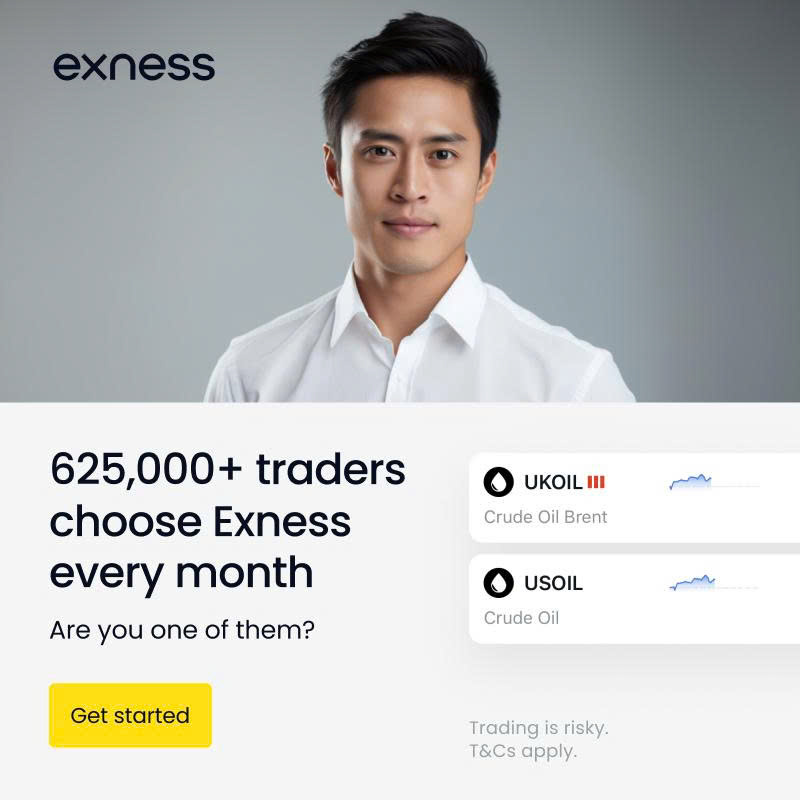
9 minute read
How to Start Forex Trading in Ethiopia: A Comprehensive Guide
from Exness
by Exness Blog
Forex trading, or foreign exchange trading, has gained significant popularity worldwide, including in Ethiopia. With the rise of internet access and digital platforms, more Ethiopians are exploring forex trading as a way to diversify income streams and achieve financial independence. However, starting forex trading in Ethiopia requires careful planning, education, and the right tools to succeed in this dynamic market.
Top 4 Best Forex Brokers in Ethiopia
1️⃣ Exness: Open An Account or Visit Brokers 🏆
2️⃣ XM: Open An Account or Visit Brokers 💥
3️⃣ JustMarkets: Open An Account or Visit Brokers ✅
4️⃣ Quotex: Open An Account or Visit Brokers 🌐
In this comprehensive guide, we’ll walk you through everything you need to know about starting forex trading in Ethiopia. From understanding the basics to choosing a reliable broker and managing risks, this article is designed to help beginners navigate the forex market with confidence.
What is Forex Trading?
Forex trading involves buying and selling currencies to profit from fluctuations in their exchange rates. The forex market is the largest and most liquid financial market globally, with a daily trading volume exceeding $7 trillion. Traders speculate on currency pairs, such as USD/ETB (U.S. Dollar/Ethiopian Birr), aiming to buy low and sell high or vice versa.
For Ethiopians, forex trading offers an opportunity to participate in global financial markets without needing significant capital. However, success in forex trading requires knowledge, discipline, and a strategic approach.
Why Start Forex Trading in Ethiopia?
Ethiopia’s economy is growing, but challenges like inflation and limited access to traditional investment options make forex trading an attractive alternative. Here are some reasons why forex trading is gaining traction in Ethiopia:
· Accessibility: You can start trading with a small amount of capital, making it accessible to many.
· Flexibility: The forex market operates 24/5, allowing you to trade at your convenience.
· Potential for Profit: With proper strategies, traders can profit from both rising and falling markets.
· Global Exposure: Forex trading connects you to international markets, broadening your financial horizons.
However, forex trading also comes with risks, so it’s crucial to approach it with caution and a solid plan.
Step 1: Understand the Basics of Forex Trading
Before diving into forex trading, you need to grasp the fundamentals. Here’s a quick overview:
· Currency Pairs: Forex trading involves trading currency pairs, such as EUR/USD or USD/JPY. The first currency is the base, and the second is the quote currency.
· Pips: A pip (percentage in point) is the smallest price movement in a currency pair. For example, a change from 1.2000 to 1.2001 is one pip.
· Leverage: Leverage allows you to control larger positions with a smaller amount of capital. For example, 1:100 leverage means $1 controls $100 in the market. While leverage can amplify profits, it also increases risks.
· Margin: This is the amount of money required to open a leveraged position. It acts as collateral for your trades.
· Spread: The difference between the bid (sell) and ask (buy) price of a currency pair. Lower spreads mean lower trading costs.
Take time to learn these concepts through free online resources, webinars, or forex trading courses tailored for beginners.
Step 2: Educate Yourself on Forex Trading
Education is the foundation of successful forex trading. In Ethiopia, where forex trading is still relatively new, understanding the market is critical. Here are some ways to build your knowledge:
· Online Courses: Platforms like Coursera, Udemy, and Babypips offer beginner-friendly forex trading courses.
· Books: Read books like Currency Trading for Dummies by Brian Dolan or The Little Book of Currency Trading by Kathy Lien.
· YouTube Channels: Channels like Trading 212 and The Trading Channel provide free tutorials on forex strategies.
· Forex Communities: Join online forums or local trading groups in Ethiopia to connect with experienced traders.
Focus on learning technical analysis (chart patterns, indicators) and fundamental analysis (economic news, interest rates) to make informed trading decisions.
Step 3: Choose a Reliable Forex Broker
Selecting a trustworthy forex broker is one of the most critical steps for Ethiopian traders. A broker acts as an intermediary between you and the forex market. Here’s what to consider when choosing a broker:
Regulation
Ensure the broker is regulated by a reputable authority, such as:
· Financial Conduct Authority (FCA) in the UK
· Cyprus Securities and Exchange Commission (CySEC)
· Australian Securities and Investments Commission (ASIC)
Regulated brokers offer better protection for your funds and adhere to strict financial standards.
Trading Platform
Most brokers offer platforms like MetaTrader 4 (MT4) or MetaTrader 5 (MT5). These platforms are user-friendly and widely used. Test the platform’s speed, charting tools, and mobile compatibility.
Account Types
Look for brokers offering micro or cent accounts, which allow you to trade with small amounts of capital, ideal for beginners in Ethiopia.
Payment Methods
Since Ethiopia has strict foreign exchange regulations, choose a broker that supports local payment methods like mobile money (e.g., M-Pesa, Telebirr) or bank cards. Ensure the broker allows easy deposits and withdrawals in Ethiopian Birr (ETB) or USD.
Customer Support
Opt for a broker with 24/7 customer support, preferably in English or Amharic, to address any issues promptly.
Popular brokers for Ethiopian traders include XM, Exness, and FBS, known for low spreads and beginner-friendly accounts. Always research and read reviews before committing.

💥 Trade with Exness now: Open An Account or Visit Brokers 🏆
Step 4: Open a Forex Trading Account
Once you’ve chosen a broker, follow these steps to open a trading account:
· Register: Visit the broker’s website and complete the registration form with your details.
· Verify Your Identity: Submit identification documents (e.g., passport, national ID) and proof of address (e.g., utility bill) as required by the broker.
· Choose an Account Type: Select a beginner-friendly account, such as a micro or demo account.
· Deposit Funds: Fund your account using available payment methods. Start with a small amount you can afford to lose.
· Download the Trading Platform: Install MT4, MT5, or the broker’s proprietary platform on your computer or smartphone.
Most brokers offer demo accounts, allowing you to practice trading with virtual money before risking real funds.
Step 5: Develop a Trading Plan
A trading plan is your roadmap to success in forex trading. Without a plan, you’re likely to make emotional decisions that lead to losses. Here’s how to create a solid trading plan:
· Set Goals: Define your financial goals (e.g., earning $100/month) and risk tolerance.
· Choose a Trading Style: Decide whether you’ll be a day trader (short-term trades), swing trader (holding trades for days), or position trader (long-term trades).
· Select Currency Pairs: Focus on major pairs like EUR/USD or USD/JPY, which have lower spreads and higher liquidity.
· Risk Management: Never risk more than 1-2% of your account on a single trade. Use stop-loss orders to limit potential losses.
· Track Performance: Keep a trading journal to record your trades, strategies, and outcomes.
Review and adjust your trading plan regularly based on your performance and market conditions.
Step 6: Practice with a Demo Account
Before trading with real money, practice on a demo account. This allows you to:
· Test your trading strategies without financial risk.
· Familiarize yourself with the trading platform.
· Build confidence in analyzing charts and placing trades.
Spend at least 2-3 months on a demo account until you consistently achieve profitable results.
Step 7: Start Trading with Real Money
Once you’re confident in your skills, start trading with real money. Follow these tips to minimize risks:
· Start Small: Begin with a small deposit, such as $50-$100, to limit potential losses.
· Use Leverage Wisely: Avoid high leverage (e.g., 1:500) as it can wipe out your account quickly.
· Stick to Your Plan: Follow your trading plan and avoid impulsive decisions based on emotions.
· Stay Updated: Monitor economic news and events that impact currency prices, such as U.S. Federal Reserve decisions or Ethiopia’s economic policies.
Step 8: Understand Ethiopia’s Forex Regulations
Forex trading in Ethiopia operates in a unique regulatory environment. The National Bank of Ethiopia (NBE) imposes strict controls on foreign currency transactions. Here are key points to know:
· Foreign Exchange Restrictions: Ethiopian residents are limited in how much foreign currency they can hold or transfer abroad. Check with your broker for compliance with NBE regulations.
· Tax Implications: Consult a local tax advisor to understand how forex trading profits are taxed in Ethiopia.
· Local Brokers: While international brokers are more common, research any local brokers to ensure they’re legitimate and regulated.
Always comply with Ethiopia’s financial regulations to avoid legal issues.
Step 9: Manage Risks Effectively
Forex trading is inherently risky, and losses are part of the journey. Here are some risk management strategies:
· Use Stop-Loss Orders: Set stop-loss orders to automatically close trades at a predetermined loss level.
· Diversify Trades: Avoid putting all your capital into one trade or currency pair.
· Avoid Overtrading: Limit the number of trades you open to maintain discipline.
· Stay Calm: Don’t chase losses or let greed drive your decisions.
By prioritizing risk management, you can protect your capital and trade sustainably.
Step 10: Stay Disciplined and Keep Learning
Forex trading is a continuous learning process. Stay disciplined by:
· Following your trading plan consistently.
· Avoiding emotional trading decisions.
· Reviewing your trades to identify mistakes and improve.
Join forex communities in Ethiopia, attend webinars, and follow market trends to stay informed. The more you learn, the better your chances of success.
Common Mistakes to Avoid in Forex Trading
As a beginner, watch out for these pitfalls:
· Lack of Education: Trading without understanding the market leads to losses.
· Overleveraging: High leverage can amplify losses as much as profits.
· Ignoring Risk Management: Failing to use stop-loss orders or risking too much per trade.
· Emotional Trading: Letting fear or greed dictate your decisions.
· Choosing Unregulated Brokers: This increases the risk of fraud or fund loss.
Challenges of Forex Trading in Ethiopia
While forex trading offers opportunities, Ethiopian traders face unique challenges:
· Internet Connectivity: Slow or unreliable internet can disrupt trading. Ensure you have a stable connection.
· Payment Restrictions: Limited access to international payment methods can complicate deposits and withdrawals.
· Lack of Local Resources: Forex education and support in Ethiopia are still developing, so rely on reputable online sources.
Despite these challenges, with the right approach, you can succeed in forex trading.
Conclusion: Start Your Forex Trading Journey Today
Forex trading in Ethiopia is an exciting opportunity to participate in the global financial market. By understanding the basics, choosing a reliable broker, developing a trading plan, and managing risks, you can start your forex journey with confidence. While challenges like regulatory restrictions and internet connectivity exist, they can be overcome with proper planning and discipline.
Take the first step today by educating yourself, practicing on a demo account, and starting small. With patience and persistence, forex trading can become a rewarding part of your financial journey in Ethiopia.
Read more:

